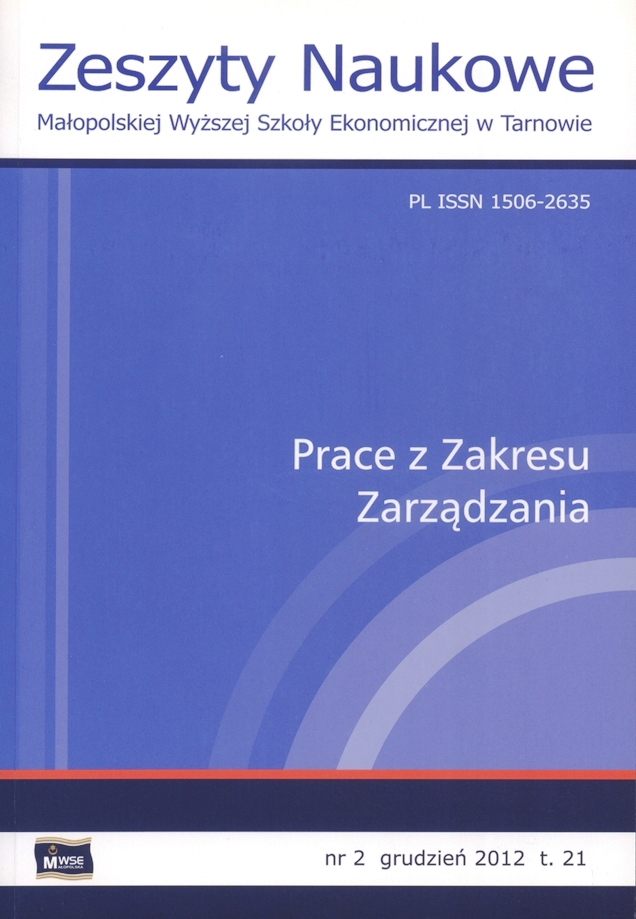Abstract
The paper proposes a general formula for analysing and designing a process management system. The general objective of the analysis is to assess the effectiveness of managerial activities and, consequently, propose necessary improvements.
The paper discusses the following issues: definition of a process management system, graphical forms of presenting processes, the concept of a process approach, methodology for analysing process management systems, assessment of process effectiveness and improvement, characteristics of designing process management systems.
The methodological issues discussed in the paper focus on two areas: methods for analysing process management systems and the designing cycle for such systems. The proposed methods for analysing process management systems include the following stages: 1) setting the objectives of and defining research areas, 2) type-oriented and quantitative selection of assessment criteria, 3) determination of assessment weightings, 4) measurement of the systems’ effectiveness.
The designing cycle in a specialised variant (referred to process management systems) corresponds to the below defined stages:
1. Description of management area.
2. Designing the pragmatics of management processes.
3. Designing the organization of management processes.
4. Designing management process instruments.
5. Analysis of management process effectiveness.
6. Improvements in process management systems.
References
Auksztol J., Balwierz P., Chomuszko M., SAP - zrozumieć system ERP, Wyd. Naukowe PWN, Warszawa 2012. ISBN 978-83-01-16737-0.
View in Google Scholar
Chrapko M., CMMI: doskonalenie procesów w organizacji, Wyd. Naukowe PWN, Warszawa 2010. ISBN 978-83-01-16291-7.
View in Google Scholar
Cieśliński W.B., Doskonalenie procesowej orientacji przedsiębiorstw: model platformy treningu procesowego, Wyd. Uniwersytetu Ekonomicznego, Wrocław 2011. ISBN 978-83-7695-091-4.
View in Google Scholar
Grajewski P., Procesowe zarządzanie organizacją, PWE, Warszawa 2012. ISBN 978-83-208-2019-5.
View in Google Scholar
Hamrol A., Zarządzanie jakością z przykładami, Wyd. Naukowe PWN, Warszawa 2008. ISBN 978-83-01-15374-8.
View in Google Scholar
Martyniak Z., Metody organizacji i zarządzania, Wyd. Akademii Ekonomicznej, Kraków 1999. ISBN 83-7252-014-3.
View in Google Scholar
Pawełek B., Metody normalizacji zmiennych w badaniach porównawczych złożonych zjawisk ekonomicznych, Wyd. Uniwersytetu Ekonomicznego, Kraków 2008. ISBN 978-83-7252-398-3.
View in Google Scholar
Piekarczyk A., Zimniewicz K., Myślenie sieciowe w teorii i praktyce, PWE, Warszawa 2010. ISBN 978-83-208-1886-4.
View in Google Scholar
Schwaninger M., Intelligent Organizations. Powerful Models for Systematic Management, Springer, Berlin-Heidelberg-New York 2006.
View in Google Scholar
Stabryła A. (red.), Doskonalenie struktur organizacyjnych przedsiębiorstw w gospodarce opartej na wiedzy, C.H. Beck, Warszawa 2009. ISBN 978-83-255-0237-9.
View in Google Scholar
Stabryła A., Zarządzanie projektami ekonomicznymi i organizacyjnymi, Wyd. Naukowe PWN, Warszawa 2011. ISBN 978-83-01-14846-1.
View in Google Scholar
Stabryła A., Categorization as an Instrument in Managing Company Development Capacity, "Argumenta Oeconomica Cracoviensia" 2005, nr 3.
View in Google Scholar
Zbichorski Z., Metody graficzne w zarządzaniu i organizacji produkcji, Wyd. Naukowo-Techniczne, Warszawa 1977.
View in Google Scholar
© Copyright by Małopolska School of Economics in Tarnów. The articles are available under the Creative Commons Attribution NonCommercial-NoDerivatives 4.0 International License


